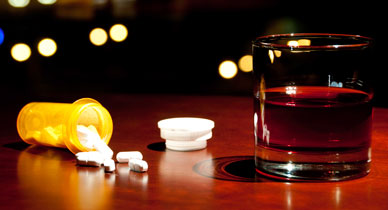It is quite common to see people drink alcohol while socializing. They also drink to enhance a social experience. Some people are not into recreational drinking though and they may limit them to a glass of wine only when they cannot avoid it in any way. Some people avoid drinking alcohol because they are on antidepressants. However, there are people who believe there is no connection between antidepressants and alcohol. Keep reading to find the truth.
Can You Drink Alcohol While Taking Antidepressants?
No you can't. Both medical professionals and manufacturers of antidepressants discourage alcohol drinking while on antidepressants. The reason is that most antidepressants can interact with alcohol and result in serious side effects. On the other hand, an antidepressant medication will no longer be fully effective even if you drink a small amount of alcohol every day. It means the more you drink the less effective your antidepressant will be.
 You may also notice some specific issues when mixing antidepressants and alcohol together. For instance:
You may also notice some specific issues when mixing antidepressants and alcohol together. For instance:
- You are going to feel more anxious or depressed. This will make it more difficult to treat your symptoms. While alcohol appears to improve your mood, the effect lasts for a short time only. This is usually followed by a period of increased anxiety and depression.
- You may notice serious side effects if you are taking other medications as well. The most common are sleep medications, anti-anxiety medications, and prescription pain medications.
- You may experience impaired alertness and thinking. The combo of alcohol and antidepressants can easily affect your judgment, coordination, and reaction time. You may feel sleepy and fail to drive or do other tasks that require attention and focus.
- Your liver will fail to function properly because your liver processes both antidepressant medications and alcohol. If you take both together, your liver may not be able to metabolize either the alcohol or the medication properly.
- The combination may increase serotonin levels in your brain. Drinking alcohol alone can affect the serotonin activity that in turn may affect signaling and neurotransmission. Antidepressant medications will do the same and increase levels of serotonin that may cause maniac symptoms, dangerous mood swings, and risky behavior.
Can You Stop Your Antidepressants to Drink Alcohol?
Now that you know the issues associated with antidepressants and alcohol, you may be thinking if you can stop taking antidepressants for a while to drink alcohol. This is not a good idea. You have to take antidepressants in a timely manner to avoid making your depression symptoms worse. What you should do is cut back on social drinking and consider it a part of your treatment for depression.
You should also bear in mind that there will be serious withdrawal symptoms if you stop taking your medication to drink alcohol. The most common symptoms are headaches, dizziness, brain zaps, and flu-like symptoms. You may find yourself under serious depression with strong suicidal thoughts. It is therefore a better idea to stop drinking alcohol and continue with your antidepressant treatment.
Reaction of Combining Different Antidepressants and Alcohol
What side effects you experience when mixing antidepressants with alcoholwill also depend on what types of antidepressants you are taking.
1. Selective Serotonin Re-Uptake Inhibitors (SSRIs)
You may not notice any side effects if you mix alcohol with SSRIs like fluoxetine. Similarly, there may not be any change in cognitive or motor functioning if you combine alcohol and SSRIs such as escitalopram, sertraline, and citalopram. However, SSRIs such as Luvox and Paxil can interact with alcohol and cause side effects such as impaired motor skills and cognition abilities.
2. Tricyclic Antidepressants (TCAs)
You may feel drowsy and notice a significant change in your cognitive and motor senses when combining alcohol with TCAs such as amitriptyline. You are more likely to feel the effects within the first few weeks of starting these antidepressants. Mianserin, trazodone, and other related antidepressants in this category may also interact with alcohol. You should avoid drinking alcohol especially during the first few weeks of taking these antidepressants.
3. Selective Serotonin Reuptake Inhibitors (SNRIs)
They are quite similar to SSRIs and react to alcohol in the same fashion. Manufacturers of these SNRIs encourage people to avoid combining it with alcohol because it could lead to side effects such as impaired coordination, increased drowsiness, etc. They are a relatively safer option when you want to combine antidepressants and alcohol, but you should still avoid doing so.
4. Monoamine-Oxidase Inhibitors (MAOIs)
You may notice dangerous side effects when combining MAOIs with alcoholic beverages such as wine, beer, and sherry that contain a protein called tyramine. Antidepressants interact with this protein and cause serious side effects, including a dangerous spike in blood pressure. You should avoid all alcoholic beverages if you are currently taking MAOIs. You may not experience any side effects though if you are taking a reversible MAOI such as moclobemide.
5. Atypical
Antidepressants with unique properties fall under this category. Since their properties vary a lot, how they react with alcohol varies in the same way. If you are taking drugs like Remeron, you may notice impaired motor skills. Other drugs in this category like Wellbutrin may also increase the risk of seizures. Some drugs like Viibryd may not have serious side effects and react similarly to SSRIs. It is therefore a good idea to talk to your doctor to know exactly what types of side effects you may notice when combining these antidepressants and alcohol.
